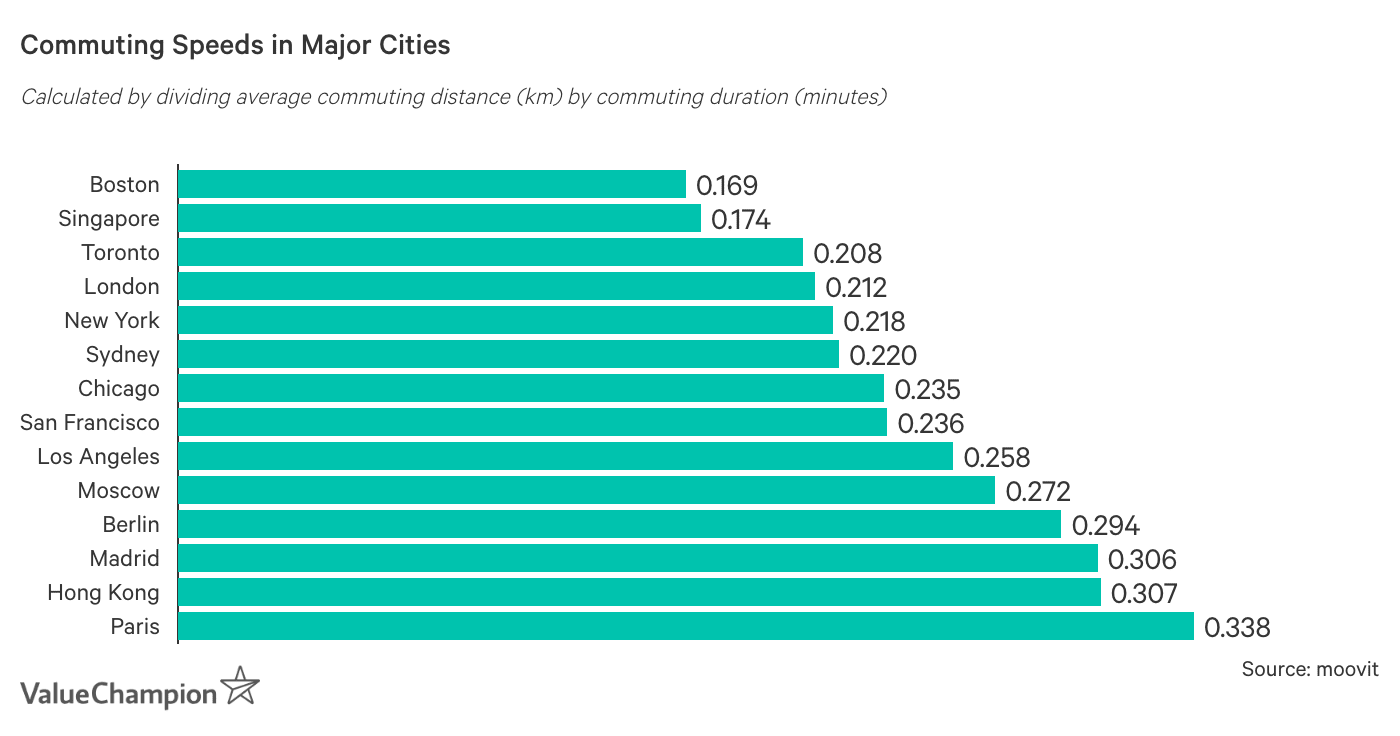People always tend to grumble about their city’s public transportation system. This made us curious, how do transportation systems compare? And how well is Singapore’s system actually performing? To find out, we analysed publicly available data with the goal of getting a better picture of how Singapore compares to other major cities around the world.
Singaporeans Wait Less Than Other Commuters
Nothing makes passengers more upset than having to wait a long time for their train or bus. Thankfully for Singaporeans, the average wait time of 12 minutes in Singapore is shorter than most other major cities. Additionally, fewer travellers in Singapore have very long waits, with just 11% of these individuals having to wait 20 minutes or more. This contrasts starkly with American cities, where long waits are common. For example, 38% of individuals in Los Angeles and 24% of those in Boston wait more than 20 minutes for their transit line every day.

More Than Meets the Eye: Singapore’s Slow Commute Speed
With that said, Singapore’s transit system may not be as perfect as most reports claim. For instance, while Singaporeans have the second shortest average commute (14 km total), they spend the fifth most time commuting (1 hour and 24 minutes) of cities in our review, implying that Singapore has the 2nd slowest commuting system. From this perspective, there is room for improvement in Singapore. However, this finding should be taken with a grain of salt. Cities that are more spread out may be able to transport passengers more rapidly, resulting in faster average commute times.

Are There Any Other Indications of Singapore’s Public Transportation System’s Success?
In terms of efficiency, Singapore’s transit system appears to be performing fairly well, with some room for improvement. However, while efficiency is a crucial measure of a public transportation system’s performance, there are other important characteristics to consider.
Singapore’s Public Transportation System is Relatively Inexpensive
For example, in addition to being relatively efficient, Singapore’s public transportation options appear to be more affordable than those of other cities. A study conducted by Nanyang Technological University (NTU) and commissioned by the Public Transport Council (PTC) found that the average fare revenue per passenger-kilometre was lower in Singapore (S$0.11) than any other city with complete data. Additionally, data from the same study suggests that Singaporeans spend the second least on public transportation in terms of their disposable income. This further suggests that the city’s public transportation system is relatively inexpensive compared to others. Singapore’s transit fares can be even cheaper for commuters that leverage optimised credit card use. For example, some cards offer EZ-Link rebates of up to 2%.

Singaporean’s Generally Approve of Their Public Transportation System
Public opinion is another factor worth considering. After all, these are the customers and their satisfaction is another key piece of information for judging success of each system. Singapore also fares very well by this measure. For example, a study by McKinsey & Company found that 86% of the population approves of the current public transportation situation and 84% approve of recent changes to the system. Both of these figures are significantly higher than those of most other cities, representing another indication that Singapore’s public transportation is performing well relative to other major cities.

Where Does Singapore’s Public Transportation Rank?
Based on efficiency, it appears that Singapore’s public transportation system performs relatively well compared to those of other cities. Additionally, when taking into account other key indicators such as affordability and customer satisfaction, it appears that Singapore’s is among the best in the world. Therefore, while there is always room for improvement, it seems reasonable to believe that Singapore’s public transportation system is performing relatively well.
Other Considerations & Limitations
While we believe the available data allows us to make a relatively accurate characterisation of the public transportation in Singapore compared to others around the world, there are some limitations to our research. First of all, we based our analysis primarily on system wide averages. Therefore, we cannot account for specific strengths or weaknesses of a given transportation system, for example, a particularly inefficient train line. Additionally, it would be worthwhile to consider relative accessibility across neighborhoods within each city, financial solvency and safety of each system, among other topics. Finally, we were unable to find complete data for every city featured in our analysis, making it difficult to assess how some cities compared in terms of every category.
The article Is Singapore’s Public Transportation System Really That Efficient? originally appeared on ValueChampion.
ValueChampion helps you find the most relevant information to optimise your personal finances. Like us on our Facebook page to keep up to date with our latest news and articles.
More From ValueChampion:
Source: VP

